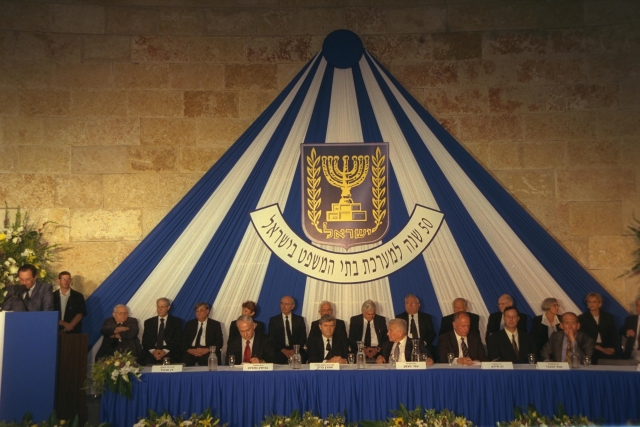Have you ever wondered why Israel does not have a full constitution? The reason can be traced (or blame depending on how you feel about it) to a man named Yizhar Harari.
In 1950 the Israeli parliament, the Knesset, passed what is now called ‘the Harari Proposal’, which stated that the Knesset would gradually enact what is called 'Basic Laws' that would eventually serve as 'Articles' of the future constitution upon the completion of the constitutional project.
During the last 70 years, the Knesset has gradually enacted almost fifteen Basic Laws, including institutional Basic Laws such as Basic Law: The Knesset, Basic Law: The Government, Basic Law: The Judiciary, the two important Basic Laws on Human Rights – Basic Law: Human Dignity and Liberty and Basic Law: Freedom of Occupation – and the controversial Basic Law: Israel the Nation-State of the Jewish People.
However, as one can see from the unstable nature of governments and the constant threat of new elections, the controversy over the Knesset as a constituent authority is what has held up the formation of a full constitution. Despite there being many Basic Laws that cover almost every aspect of Israeli life, there is one Basic Law that is missing, a Law governing 'Legislation'. To date, the legislative process in Israel is regulated by the Knesset rules of procedure which is an informal document that can change at the whim of any government and its needs. The Knesset's Legislative rules make no mention of things like the status of primary legislation and they set identical procedures for enacting ordinary laws and Basic Laws, thereby further obscuring and complicating the differentiation between the two. Essentially, the Knesset's own rules are obscuring the really important laws from the ones that are more akin to campaign promises of handouts that politicians always make.
So, how did Israel's political system become so messy? It comes down to decisions made in the early days of the state. Now, Israel’s Declaration of Independence specifically called for the drafting of a constitution “not later than the 1st October 1948.” Yet, in June of 1950, no work had been done to ratify one - in fact, few Knesset members had the stomach to do so and they kept 'kicking the can' down the road. The problem was infighting between the different interest groups that made up and still make up the governing body. Religious parties refused to sign onto any set of rules that were not mandated by the Torah - essentially they would only agree to biblical law. This was especially a problem when it came to civil liberties, like granting homosexuals, adulterers, and non-religious the same civil liberties as anyone else. Even basic human rights such as freedom of speech and religious expression have different parameters under Jewish law than they do as a civil rights guaranteed by most Western democracies, which Israel's founders wanted to model the country after.
Oddly, the leading voice against a constitution was the man who famously read the Declaration of Independence that established the State of Isreal, David Ben-Gurion who was Prime Minister when this debate was going on. In a Cabinet meeting held on December 13, 1949, Ben-Gurion argued that the new state did not have enough time to develop a constitution and that there were more important tasks at hand such as defending the country against external threats, bringing in new immigrants, building infrastructure across the country and making the Negev Desert habitable for settlement. Ben-Gurion said, “The coming few years are the most important in our history. If anyone thinks that declaring independence or winning the war was what was needed to found the state, they’re wrong. The work is all ahead of us”.
After more than a year of continued debate on the issue, the First Knesset adopted a compromise on June 13, 1950. The compromise, known as the “Harari Proposal,” was sponsored by Knesset Member Yizhar Harari and stipulated that instead of a single document, the “constitution” of Israel would be composed of a series of Basic Laws to be created over time by a special committee and approved by the Knesset.
The Harari Proposal states that"
The First Knesset instructs the Constitution, Law, and Justice Committee to prepare a draft State Constitution. The constitution will be built chapter by chapter, in such a way that each will constitute a separate Basic Law. The chapters shall be presented to the Knesset when the committee completes its work, and all the chapters together shall comprise the Constitution of the State.
Obviously, the subsequent Knesset sessions never looked back on this proposal - and opted to ignore establishing laws that could and would have solved many of the internal issues that have plagued the country - like the type of government structure the country has that could have brought stability to the political system. Today, the system is fundamentally broken, with a minority of people able to subvert the will of the majority and literally hold a government hostage if petty, and often monetary demands are not met.


